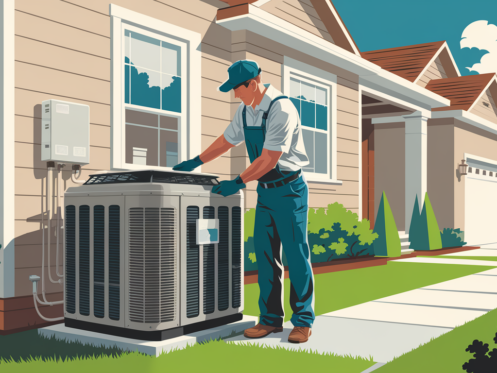When your air conditioning unit freezes, it can quickly disrupt the comfort of your home and cause higher energy costs. A frozen AC unit not only struggles to cool your living space effectively but can also cause further damage if not addressed promptly. This guide will help you understand the causes of a frozen AC unit and provide solutions to get your system back up and running smoothly.
Air conditioning systems are complex, yet understanding their basics can help you troubleshoot issues. For a basic understanding of how AC systems work, you can refer to How Do Air Conditioners Work? This knowledge will be beneficial as we explore the reasons behind AC freezing and how to resolve it.
Understanding Why AC Units Freeze
An air conditioning unit functions by absorbing heat from your home and releasing it outside. When something goes wrong in this process, it can lead to the unit freezing. The reasons for freezing often involve a disruption in airflow or refrigerant levels.
There are several potential causes for an AC unit to freeze:
- Airflow Issues: When the airflow is restricted, the cooling coil can become too cold, leading to freezing. This can be caused by blocked or dirty air filters. For more information, visit Evaporator Coil Freezing Up Tips.
- Coolant Problems: Low coolant levels can cause the pressure in the system to drop, leading to freezing. For more details on common AC problems, visit Common Air Conditioner Problems.
- Faulty Thermostat Settings: Incorrect thermostat settings can cause the unit to work improperly, leading to freezing. Ensure your thermostat is set to the correct temperature for optimal performance.
Understanding these basic causes will help you identify why your AC might be frozen and take the necessary steps to fix it. In the following sections, we will delve into common causes and solutions to ensure your home remains comfortable and energy-efficient.
How to Fix a Frozen AC Unit
If your AC unit is frozen, follow these steps to troubleshoot and fix the problem:
- Turn Off the AC: First, switch off the AC unit to allow it to defrost naturally. This may take several hours, so be patient.
- Check and Replace Air Filters: Once the unit has defrosted, inspect the air filters. Replace them if they are dirty or clogged to ensure proper airflow.
- Inspect Thermostat Settings: Make sure your thermostat is set to the correct temperature. Adjust settings as needed to prevent future freezing.
- Call an Expert: If the problem persists, especially if you suspect low refrigerant levels, it’s essential to call an expert. Handling refrigerant requires expertise and safety precautions. For professional help, visit Air Conditioner Repair.
Remember, safety is paramount. If you’re unsure about any step or if the problem seems beyond a simple fix, don’t hesitate to seek professional assistance. Quality Cooling & Heating is here to help with expert HVAC services to keep your home comfortable and safe.
Preventing Your AC from Freezing Again
Keeping your air conditioning system in top shape can save you from the hassle of dealing with a frozen AC unit. Here are some maintenance tips to help prevent future issues:
- Regular Maintenance and Inspections: Plan regular check-ups with a professional HVAC technician to ensure your system is running smoothly. Regular maintenance can catch potential problems before they lead to freezing. For more tips, visit Prevent AC Unit Freezing Pipes.
- Ensure Proper Airflow: Make sure vents and air filters are clean and unobstructed. Blocked airflow can cause your AC to freeze, so regularly check and replace air filters as needed.
- Check Coolant Levels: Low coolant levels can lead to freezing. If you suspect a refrigerant issue, it’s best to contact a professional for a safe and good fix.
For more tips on maintaining energy efficiency, visit the Home Cooling Systems page.
Ensuring Year-Round Comfort
Maintaining your air conditioning system is key to ensuring year-round comfort in your home. Regular maintenance and quick repairs not only prevent issues like a frozen AC unit but also keep your system running efficiently. Here are some important takeaways to remember:
- Regularly check and replace air filters to ensure proper airflow.
- Keep an eye on your thermostat settings to prevent unnecessary strain on your system.
- Schedule regular inspections to check coolant levels and overall system health.
- Act quickly if you notice signs of AC freezing to avoid further damage.
For homeowners in the Greater Austin area and Abilene, contacting Quality Cooling & Heating ensures you receive expert HVAC and plumbing services. Their commitment to high-quality, customer-focused service makes them a reliable partner in maintaining your home’s comfort. Whether it’s routine maintenance or emergency repairs, they are equipped to handle all your needs. Ensure your living environment remains comfortable and safe with Quality Cooling & Heating’s comprehensive services.


